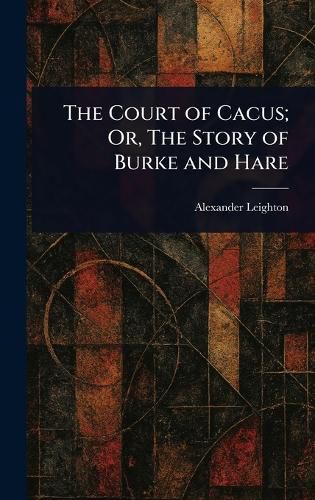Readings Newsletter
Become a Readings Member to make your shopping experience even easier.
Sign in or sign up for free!
You’re not far away from qualifying for FREE standard shipping within Australia
You’ve qualified for FREE standard shipping within Australia
The cart is loading…






This title is printed to order. This book may have been self-published. If so, we cannot guarantee the quality of the content. In the main most books will have gone through the editing process however some may not. We therefore suggest that you be aware of this before ordering this book. If in doubt check either the author or publisher’s details as we are unable to accept any returns unless they are faulty. Please contact us if you have any questions.
Delve into the chilling true story of Burke and Hare, the infamous Edinburgh body snatchers, with Alexander Leighton's "The Court of Cacus: Or The Story of Burke and Hare." This historical account meticulously details the shocking crimes that gripped 19th-century Britain. Explore the grim realities of murder and body snatching as Leighton unveils the events surrounding William Hare and his accomplice.
More than just a historical record, "The Court of Cacus" offers a glimpse into the dark underbelly of a society grappling with poverty, desperation, and the burgeoning field of medical science. Uncover the motives and methods of these notorious criminals in this gripping exploration of true crime. Leighton's work provides a detailed and compelling narrative of a case that continues to fascinate and disturb, solidifying its place in the annals of criminal history. A crucial text for anyone interested in true crime, British history, or the social context of criminology.
This work has been selected by scholars as being culturally important, and is part of the knowledge base of civilization as we know it.
This work is in the public domain in the United States of America, and possibly other nations. Within the United States, you may freely copy and distribute this work, as no entity (individual or corporate) has a copyright on the body of the work.
Scholars believe, and we concur, that this work is important enough to be preserved, reproduced, and made generally available to the public. We appreciate your support of the preservation process, and thank you for being an important part of keeping this knowledge alive and relevant.
$9.00 standard shipping within Australia
FREE standard shipping within Australia for orders over $100.00
Express & International shipping calculated at checkout
This title is printed to order. This book may have been self-published. If so, we cannot guarantee the quality of the content. In the main most books will have gone through the editing process however some may not. We therefore suggest that you be aware of this before ordering this book. If in doubt check either the author or publisher’s details as we are unable to accept any returns unless they are faulty. Please contact us if you have any questions.
Delve into the chilling true story of Burke and Hare, the infamous Edinburgh body snatchers, with Alexander Leighton's "The Court of Cacus: Or The Story of Burke and Hare." This historical account meticulously details the shocking crimes that gripped 19th-century Britain. Explore the grim realities of murder and body snatching as Leighton unveils the events surrounding William Hare and his accomplice.
More than just a historical record, "The Court of Cacus" offers a glimpse into the dark underbelly of a society grappling with poverty, desperation, and the burgeoning field of medical science. Uncover the motives and methods of these notorious criminals in this gripping exploration of true crime. Leighton's work provides a detailed and compelling narrative of a case that continues to fascinate and disturb, solidifying its place in the annals of criminal history. A crucial text for anyone interested in true crime, British history, or the social context of criminology.
This work has been selected by scholars as being culturally important, and is part of the knowledge base of civilization as we know it.
This work is in the public domain in the United States of America, and possibly other nations. Within the United States, you may freely copy and distribute this work, as no entity (individual or corporate) has a copyright on the body of the work.
Scholars believe, and we concur, that this work is important enough to be preserved, reproduced, and made generally available to the public. We appreciate your support of the preservation process, and thank you for being an important part of keeping this knowledge alive and relevant.